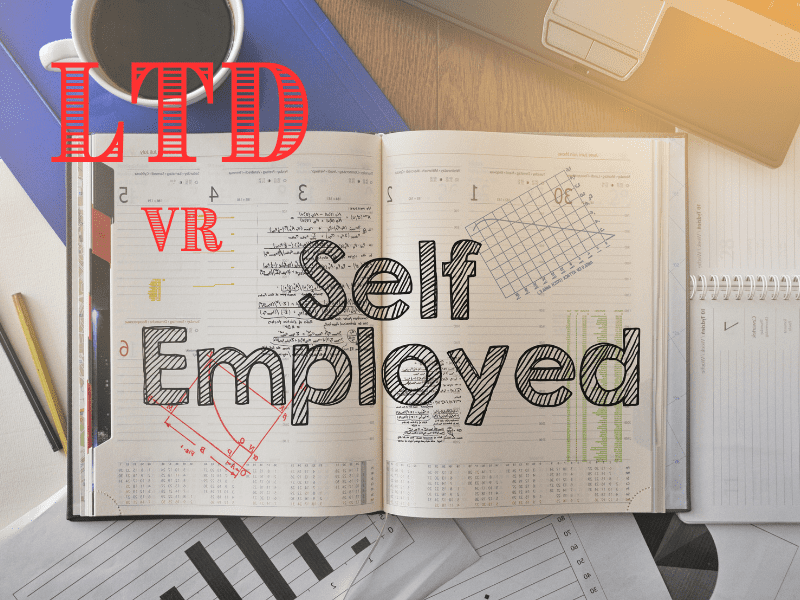
Are you planning to set up a company in the UK and wondering which solution to choose – limited company or self-employed? Depending on the specifics of your business, one of them may turn out to be more beneficial than the other. Read the article below to learn about the pros and cons of both legal structures and decide which is the better choice for you.
Limited company vs self-employed – which is a better solution?
There are quite a few differences between the two most common types of business structures. Therefore, it is very important to pay attention to the following points in order to be able to determine which structure will be best for you.
Limited company vs self-employed UK – ownership
At the very beginning, you have to decide whether you will be a sole proprietor or a co-owner. Making this decision will help you choose the right legal structure. Compared to a limited company, being self-employed means sole ownership of the company. In the case of a private limited company, it may be managed by one or more persons.
Self-employed vs limited company – tax issues
Both limited companies and self-employed persons are taxed in different ways:
Tax on a limited company
As for a private li company, it has a separate legal entity from its shareholders and directors. In turn, all business and personal matters of persons who run a sole proprietorship are treated as one for tax purposes.
What’s more? When comparing limited companies to self-employed people, it should be noted that they pay corporate tax on all annual profits. In addition, company directors are individually taxed on the income they derive from the company through an annual self-assessment process.
Important! Dividend Tax is levied on any dividends received from the company, while Income Tax and Class 1 NICs are payable on salaries paid by the company. The company is also required to pay Class 1 NICs on wages paid to employees.
Self-employed and taxes:
If you are self-employed, you are taxed on all profits you make during the year through the self-assessment process. Class 2 National Insurance Contributions (NICs) are for self employed taxpayers. They are calculated at a flat rate of 2.8% per week, as part of the Self Assessment tax return process. Whether you are self-employed or a limited company, you are required to register for Value Added Tax (VAT) when your turnover reaches £85,000 or more in a year.
Self-employed vs limited company – administration and costs
When comparing a limited company to self-employed, it is important to remember that both business structures are also subject to different reporting requirements that determine the amount of time you need to spend on administrative work. In general, people who run a sole proprietorship spend less time on formalities than private limited companies.
In the case of limited companies, they are registered with Companies House. It is your responsibility to inform the registrar of companies of any changes to your company, submit the acknowledgment, PSC and copies of company accounts. What is important? If you can do it yourself is will cost you only £13. An additional advantage of this solution is the possibility of registering a company via the Internet, which can be done within a few hours.
In turn, self-employed people, although they still have to keep accurate records and comply with industry regulations, have less legal burden on them. The self-employed most often use accounting services to fill out documents or help with annual settlements. Sole traders are required to tell HMRC when they become self-employed.
Self-employed vs limited company tax – liability
Liability of a limited company
When comparing a limited company to self-employed, it should be emphasized that it is a separate legal entity. Therefore, if something goes wrong, the company and not its directors are liable. What’s more? If your business goes bankrupt and owes money to creditors, you will not be required to pay debts to creditors from your personal assets (provided no fraud or other crime has occurred).
Thus, the term private limited company results from the fact that the liability of company directors is limited. It should be noted that this is one of the greatest advantages of running a company as a LTD company, compared to sole trader.
Self-employed liability
As a self-employed person, you are personally responsible if something goes wrong, for example if your business goes into debt. In the event that your business fails, you need to be aware that creditors may be suing you for your personal assets.
Limited company vs self-employed UK – access to credit (mortgage, loan)
You should know that a LTD company is more likely to get a bank loan or mortgage than a self-employed person. However, this does not mean that a self-employed cannot get a mortgage at all – he simply has fewer credit options. In addition, it may be a bit more difficult for people who run a self-employed to attract investors.
Benefits and minuses of self-employed vs limited company
Advantages of being a Sole trader:
- the ability to start your business as soon as you want
- fewer formalities
- control over your business
- keeping all profits you make after paying tax
- greater privacy
Disadvantages of being a self-employed:
- unlimited liability
- limited funding opportunities
- lower tax efficiency
- less credibility
- no protection of your company name
Advantages of being a limited liability company:
- limited liability
- greater tax efficiency
- funding opportunities
- greater credibility
Disadvantages of being a Limited Liability Company:
- greater difficulty in setting up and running a company
- less privacy
Difference between limited company and self-employed
The main differences between a limited company and a self-employed person are:
Limited liability company:
- is owned by one or more people
- pays 19% corporate income tax, dividend tax (if any), employee income tax, if any
- the business owner has limited liability
- the company has more stringent reporting requirements, which involves more formalities
Self-employed:
- the company is owned by one person
- 20 to 45% income tax,
- the business owner is responsible for the company’s debts
- simpler and easier reporting process – reports to HMRC
Comparing self-employed to a limited company, there are significant differences in each of these business structures. They can affect everything from profits to paperwork to future business plans for growing your business. If you are not sure what decision to make, you can always seek advice from an experienced accounting expert such as Lidertax.




